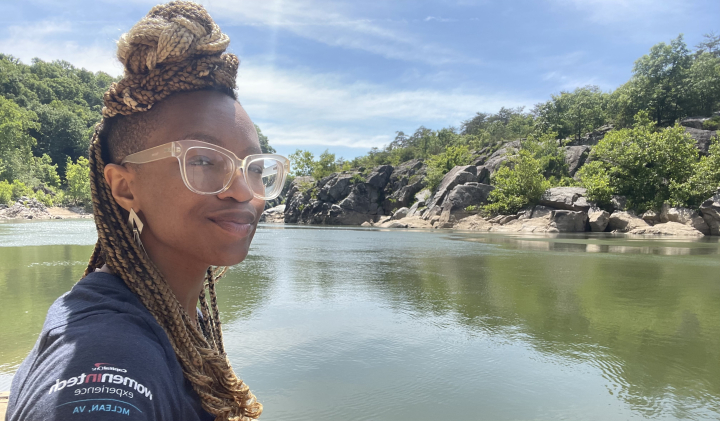UMD Alum Ogue Addeh Bridges Psychology and Computer Science in Tech World
On weekends, University of Maryland alum Ogue Addeh (B.S. '16, psychology; B.S. '16, computer science) can be found gracefully moving to the rhythms of salsa, bachata and swing. But come Monday, Addeh's dance floor becomes a digital landscape where she combines her passion for psychology with the world of computer science.
Addeh is a user researcher and UX team facilitator at Cambio Labs. However, her journey into the tech space was less conventional than most of her peers. Initially enrolled as a psychology major at UMD, an out-of-the-ordinary course redefined her academic and professional journey.
One course, endless possibilities
In her sophomore year, Addeh enrolled in a non-major course on Python taught by Professor Emeritus Ben Bederson. This course, distinct from the traditional fast-paced Computer Science 100, was designed to be more accessible and engaging for newcomers.
"Professor Bederson taught the course for non-majors, which was quite eye-opening," Addeh said. "The Department of Computer Science introduced this new course around the same time I was at UMD, and I quickly took advantage of it because it sparked my interest in programming."
Addeh decided to blend her psychology background with her newfound interest in technology. Rather than abandoning her major, she added computer science as a minor, showing the interdisciplinary nature of both fields.
UMD's rigorous computer science minor curriculum, almost equivalent to the major, further confirmed her decision.
"The minor is almost as challenging as the major, with nearly the same projects and rigor, minus a few 400-level classes," Addeh said. "I spent significant time on projects, often attending TA office hours not just for help but to work close to those well-versed in the field. This experience in computer science fostered many friendships and connections for me and gave me a whole new perspective."
Unlikely union
Driven by her psychology background and human-centric approach, Addeh sought to understand how to create innovative programs that focus strongly on human behavior.
For her honors project in psychology, she designed a Google Chrome extension using psychological concepts to diminish online distractions. This commitment to bridging technology and human behavior remained a recurring theme in her journey.
While juggling her responsibilities in both disciplines, she worked in behavioral science labs, ran her own studies and further explored the realms of humans and computers.
"Once I delved into the world of tech, it became an exploration of networking and discovering intersections, especially in human-computer interaction," Addeh shared. "I engaged with HCI professors at UMD, sought opportunities and even interned in the field with the support of teachers like Larry Herman. Unlike my peers with a more defined path in tech, I had to carve out my unique lane, determining the area and the field I should pursue."
Where it all came together
Cambio Labs recognized the unique skill set Addeh brought to the table. Cambio Labs is a nonprofit organization that develops educational technology and curriculum programs to turn students into social entrepreneurs, designers for impact and community activists.
In her current role as a user researcher, she applies some of her psychology knowledge to enhance user experience.
"User focus is essential in tech," Addeh said. "It's about engaging with potential users, understanding their needs, and ensuring products are intuitive. Often, products released without this insight can confuse people. Being iterative and seeking feedback from the outset is key. My user-centered approach has been valuable as a researcher, positioning me as a final safeguard for users' interests."
Looking back
Addeh credits the University of Maryland's comprehensive curriculum for equipping her with the skills to adapt and innovate.
"UMD provided a solid foundation in education, emphasizing the importance of teamwork and adaptability," Addeh remarked. "Even though our tasks differ, collaboration is key. UMD also instilled the confidence to learn and adapt to new technologies continuously. Even if I don't use specific programming languages that were taught, the foundational concepts ensure I can swiftly master new tools."
Embracing a holistic perspective on career exploration, Addeh advocates for a journey of self-discovery and interdisciplinary curiosity.
“I think students should feel free to consider all parts of themselves when thinking of careers,” Addeh shared. “If there are multiple areas they’re interested in, go find out if there are any intersections of those fields. Exploring an un-walked journey can be more difficult, but it may be worth it to chart your own path, and you can learn about fields you may have never thought of before. You never know what you will find when you follow your interests.”
In blending psychology and digital innovation, Addeh exemplifies versatility and the integration of arts and technology. Her shift from psychology to computer science highlights the limitless opportunities available when boundaries fade and determination to effect change prevails.
—Story by Samuel Malede Zewdu, CS Communications
The Department welcomes comments, suggestions and corrections. Send email to editor [-at-] cs [dot] umd [dot] edu.
